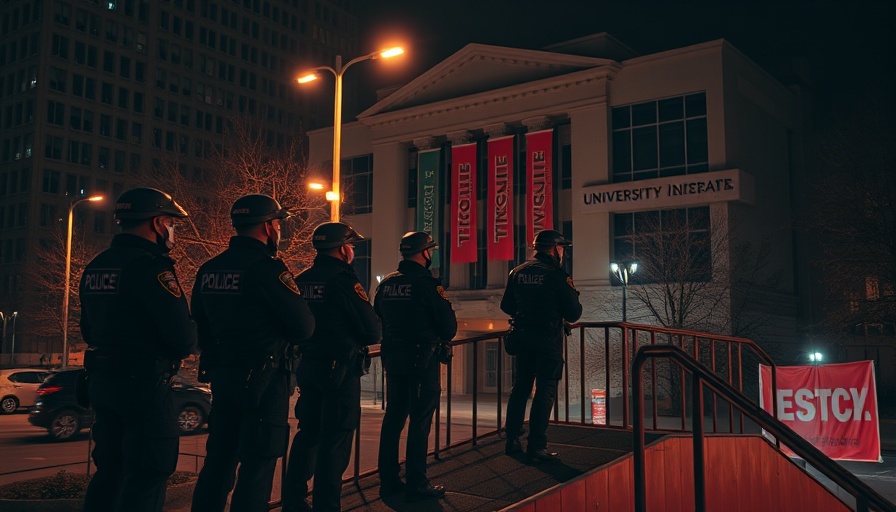
Columbia University Takes Stands Amid Controversy
Columbia University has made headlines after announcing a series of disciplinary actions against students involved in pro-Palestinian protests that escalated into an occupation of Hamilton Hall last spring. The university's interim president, Katrina Armstrong, described the administration's concerns regarding antisemitism as legitimate, indicating a willingness to partner with federal authorities to address accusations raised by President Trump’s administration.
Understanding the Protests: A Backdrop of Tension
The protests at Columbia coincided with a broader national narrative prompted by the tragic escalations following Hamas's attack on Israel in October 2023. These demonstrations attracted attention for their strong pro-Palestinian sentiments, leading to heated counter-protests. Many students demanded an end to military assistance to Israel and called for universities to divest from Israeli interests. This socio-political landscape has inevitably stoked divisions. Such tensions are echoed across various campuses in the United States, with accusations of antisemitism and Islamophobia becoming more commonplace.
Details of the Disciplinary Actions
The university has opted for a range of sanctions based on the severity of each student's involvement. This includes multi-year suspensions, temporary degree revocations, and expulsions — though the institution has refrained from disclosing specific names or the total number of affected students. This lack of transparency has been a point of concern and debate among students and faculty alike.
Impact of Federal Government Intervention
Significantly, Columbia's decision comes shortly after the federal government rescinded $400 million in grants due to its perceived inadequate response to antisemitism. The Trump administration's harsh and public criticism has placed pressure on universities to not only act but to be seen as proactive in promoting a safe environment for all students. The actions taken by Columbia signify a shift as they seek to reclaim order and uphold scholarly values amidst the chaos.
Responses from the Community
The reaction to the punishments has been mixed. Brian Cohen, Executive Director of Columbia/Barnard Hillel, welcomed the decisions as vital for righting past wrongs, highlighting the complications that arose from the protests, which he argues sometimes turned hostile toward Jewish students. On the opposite side, many student activists and faculty members have expressed discontent, viewing the university's measures as overly punitive and chilling free speech.
The Broader Implications for University Policies
What’s unfolding at Columbia may set a precedent for similar cases across the country. Schools are facing increasing scrutiny over their handling of politically charged protests, as they attempt to balance free expression with safety and community standards. The actions taken at Columbia might inspire other institutions to reevaluate how they enforce conduct codes in politically sensitive climates.
Historical Context: Protests at Colleges and Universities
Historically, universities like Columbia have been hotbeds for activism and social movements. From the civil rights movement to anti-war protests, students have consistently used their platforms to challenge governance and societal norms. The current situation, however, highlights a potentially new chapter where federal influence could start dictating university policies and student behaviors.
What Lies Ahead?
Looking forward, the divisions witnessed on campus may only intensify as similar protests arise. As universities navigate between maintaining order and upholding freedom of expression, a critical conversation about the roles and responsibilities of educational institutions is already underway. It’s clear that this will not be the last instance where student activism meets administrative discipline.
The ramifications of Columbia's actions reach beyond its walls, prompting educators and administrators nationwide to reflect on their own policies. With student voices becoming louder and more insistent on social issues, a delicate balance must be found, ensuring that all students feel equally safe and heard in their academic environments.
As the landscape of higher education evolves, it is essential to recognize how historical patterns inform current decisions, seeking to learn from past mistakes while fostering a nurturing environment for open dialogue and protest.
 Add Row
Add Row  Add
Add 



Write A Comment